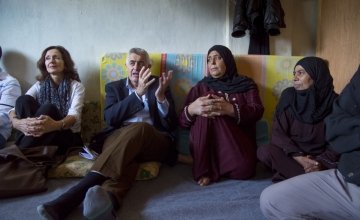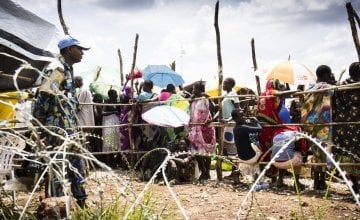
Read our 2023 annual report

Knowledge Hub
Reflections on the UN Summit

"Present in this hall today are representatives of governments that have ignored, facilitated, funded, participated in or even planned and carried out atrocities inflicted by all sides of the Syria conflict against Syrian civilians."
There was a boldness and an urgency to the tone of the United Nations Secretary General’s final address to the UN General Assembly this week.
For a man known to champion quiet diplomacy in resolving conflict, his sharp condemnation of all parties to the Syrian conflict clearly revealed his exasperation with the years of relentless violence. He was visibly shocked and disgusted by the previous evening’s attack on humanitarian aid convoys seeking to reach Aleppo.
President Obama, also in his final address to the Assembly, had dropped much of his own renowned rhetoric on hope and idealism, in favour of a more direct and foreboding address that reflected the stark realities of a world embroiled in increasing conflict and insecurity.
"Time and again human beings have believed they finally arrived at a period of enlightenment, only to repeat cycles of conflict and suffering. Perhaps that's our fate," Obama warned.
International leaders have been found wanting
It stuck me that the honesty of these speeches, often absent at the General Assembly, only came as both men were coming to the end of their term, when they felt they had the freedom to speak their minds. However, we cannot wait for leaders to be on their way out to speak truth to power.
The very reason for this Summit was because international leaders had been found wanting in their response to the refugee crises and in their efforts to resolve the conflicts that have forced these people from their homes.
No one doubts the scale and severity of the refugee and migration crisis, which the recently concluded UN Summit was meant to address. Children are literally washing up on the shores of Europe’s beaches as they flee unrelenting fighting. As the ceasefire in Syria collapsed this week, the attack on a humanitarian aid convoy destined for the besieged people of Aleppo, shocked even the most hardened of observers.
More out of sight is the conflict and displacement far from Europe. Last Friday, on the eve of the Summit, South Sudan saw its one millionth citizen flee from the country’s civil war. Syria may be the greatest humanitarian catastrophe of our time, but there are over 65 million people currently displaced by conflict across the globe, the largest number since records began after World War Two.
Immediate suffering not addressed
It is with these staggering problems in mind that 193 countries came together to host a summit on refugees and address solutions to the problem. Now, whenever you try to get 193 countries to agree to something, there is bound to be compromise and, to some extent, disappointment. This conference was no different.
Ireland’s own Ambassador to the UN, H.E. David Donoghue, was charged with drafting the outcome document, a task no one would envy. The centrepiece of this document was an agreement to develop dual global compacts – one on safe and orderly migration and another on responsibility-sharing for refugees – over the next two years.
A commitment to a two-year process is not exactly a revolutionary step and, honestly, it does nothing to immediately address the suffering of the millions of people displaced around the world.
Furthermore, the Summit focused almost exclusively on refugees and migrants, refusing to touch on the bigger issue of internally displaced persons (IDPs) – people who flee their homes but do not cross into another country. These internally displaced persons vastly outnumber the amount of refugees but are often treated much worse simply because they do not cross an international boundary.

Ireland can have a profound impact
Despite all this, I do not view the meeting as a failure. The Summit this week may ultimately have been underwhelming in its ambition but we cannot afford to dismiss the process now that it has begun. Imperfect as it may be, it is the only existing opportunity to ensure reform for refugees is delivered at scale.
Ultimately, what is required to achieve the broader ambition of the Summit is having individual member states take a strong leadership role in turning these words into action. Ireland has already played a strong leadership role in this broader process and has earned widespread and well-deserved respect for its work drafting the refugee outcome statements.
This, as well as Ireland’s key role in crafting the Sustainable Development Goals (SDGs), has demonstrated the influence and credibility that a small nation state can deliver at the international level. As a neutral state, and one with its own history of conflict, Ireland can exercise greater influence in facilitating negotiations and finding durable solutions to the multiple crisis affecting this world. This is Ireland’s time to make a profound impact on the lives of millions.
We need to act now
The Summit also highlighted how we need to act immediately and cannot wait a further two years for international consensus. This two-year commitment does not let countries off the hook for the current crisis and here is the key thing: we know what we must do to improve the situation. We must expand and enforce UN resolutions to protect humanitarian workers, we must re-energise and prioritise robust diplomacy, particularly at the onset of a conflict before it spirals out of control, and we must close the funding gaps, which are denying affected populations their right to food, shelter, water and protection.
We don’t need a two year process for any of these – to fix what is fixable now. Shame on us if we do not deliver.
Follow Dominic on Twitter
For more updates, follow Dominic MacSorley on Twitter.


